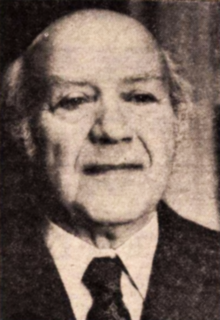Dan Simonescu | |
|---|---|
 Simonescu in 1977 | |
| Born | Dan Simon December 11, 1902 |
| Died | March 10, 1993 (aged 90) Bucharest, Romania |
| Other names |
|
| Academic background | |
| Alma mater | University of Bucharest |
| Influences | |
| Academic work | |
| Era | 20th century |
| Main interests | |
Dan Simonescu (born Dan Simon, also known as Simionescu and Simon Dănescu; December 11, 1902 – March 10, 1993) was a Romanian literary historian, bibliographer, folklorist, and librarian. His debut was in his late teens, when he accompanied Constantin Rădulescu-Codin during fieldwork in Muscel County, publishing his first contributions in the field of Romanian folklore. After graduating from the University of Bucharest in 1925, and publishing his first book, a collection of articles, in 1926, he became an assistant professor at his alma mater, and was also employed as a librarian by the Romanian Academy. Simonescu joined an editorial team headed by senior scholars Ioan Bianu and Nicolae Cartojan, and, in the 1930s and 1940s, became a major contributor to the collection and publication of old Romanian literature; he was also Cartojan's disciple, though the two disagreed on a parallel project, namely the publication of Mihail Kogălniceanu's collected works, with Simonescu favoring, and eventually putting out, a topical selection of Kogălniceanu's social-themed essays. His own first major contributions were his doctoral thesis, which explored court ceremonials in the Danubian Principalities, and a paper on the emergence of historiography in Early Modern Romania.
Having obtained a professorship at Iași University during World War II, Simonescu joined the Social Democratic Party in the late 1940s, and was briefly employed as a department head by the Education Ministry. He became marginalized during the early stages of Romanian communism: sent to do work at the Nicolae Iorga Institute of History and the Technical School for Librarians, he was involved in the technical aspects of bibliographic work. By 1956, he could return with more editions of Kogălniceanu, and more secretly networked with other old-regime intellectuals, including G. T. Kirileanu; they ensured the preservation and eventual resumption of cultural research that went against the official interpretation of Marxism–Leninism.
In the 1960s, the regime allowed Simonescu to teach at the Bucharest Pedagogical Institute, and then granted him a Bucharest University chair, which he preserved to his official retirement in 1972. He is widely seen as responsible for the definitive Kogălniceanu edition, while also contributing studies of ancient literature, including romances and rhyming chronicles, with additional returns to both bibliography and folkloristics. Simonescu was additionally instrumental in the rediscovery of historical writings by Balthasar Walther, though also criticized for allowing communist censors to remove a fragment referencing Michael the Brave's antisemitism. Organizing a specialized class for antiquarian booksellers when he was already in his late eighties, he continued to write into the early 1990s. Three years after the Romanian Revolution of 1989, and four months before his death, he was made an honorary member of the academy.